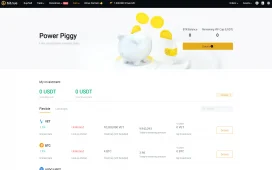BUY: Central Asia Metals (CAML)
The copper, zinc and lead miner is also to invest in an unexpected country, writes Alex Hamer.
In its search for growth, Central Asia Metals has invested in an explorer of a largely untouched mining region: Scotland. The copper, zinc and lead miner will take a 28 per cent stake in private company Aberdeen Minerals for £3mn in cash.
Chief executive Nigel Robinson said that while a stake in nickel and cobalt hopeful Aberdeen was not a transformational deal, he did see improving prospects for a battery metals mine in the UK.
“The world is changing. With the geopolitical tensions around the world, you’re finding most governments are actively encouraging the search for these future-facing metals,” he said.
Aberdeen previously raised cash at 7.5p a share last year, so this valuation has not been plucked from nowhere, but this is serious money for a company looking for metals with weak prices in an untested area for industrial mining.
From its existing business, CAML reported ebitda of $96.5mn (£76mn) for 2023, down a quarter on the year before. Both sales and the cash profit margin came contracted because of the lower zinc and lead prices, and higher costs at both the Sasa mine in North Macedonia and the Kounrad operation in Kazakhstan.
Free cash flow was also down but the impact of this on shareholders was limited, as management upped the proportion paid in dividends from the usual maximum of 50 per cent to 69 per cent. Even with this move, the final dividend is down 10 per cent to 9p.
The higher costs at Kounrad were due to more expensive electricity and wages, although its cash cost remains just $1,565 a tonne, on production of 13,816 tonnes, around level with 2022. Kounrad’s contribution to group profits was hit by a higher tax rate, driven by Kazakhstan’s efforts to balance its books: Russia’s invasion of Ukraine has affected its neighbour and ally’s economy as well.
At Sasa, costs climbed slightly but power came cheaper thanks to a new supply deal. Capital spending overall will drop by $2mn-$4mn this year, with a “light at the end of the tunnel” in terms of mine improvements across the two assets, Robinson said.
The driver for 2024 earnings will largely be metals prices: copper has traded strongly at close to $9,000 a tonne this year but zinc and lead remain weak. CAML’s cash position and low costs mean it is insulated from prices remaining low, shown by the 2023 free cash flow level, and the yield remains high.
HOLD: Bioventix (BVXP)
Its products might sound obscure, but they’re prized by medical researchers, writes Jennifer Johnson.
Monoclonal antibodies are lab-made proteins that bind themselves to specific targets in the human body. They can be used in the detection and treatment of cancer, as well as a number of other diseases. Aim-traded Bioventix produces these antibodies in sheep and supplies them to customers in the field of clinical diagnostics.
This might sound like a niche line of business, but these substances potentially have a major role to play in helping doctors more readily identify common illnesses. For instance, the company has supplied antibodies to researchers at the University of Gothenburg, who are in turn developing a blood test for the early detection of Alzheimer’s disease.
Revenue at Bioventix continued to tick up in the six months to the end of December 2023, thanks in large part to increased product sales and associated royalties from customers in China. However, the company said that sales of its troponin antibodies — which are used in heart disease tests — were a little below its expectations. “Whilst this has inhibited growth short term, there is no obvious reason to doubt the previous forecasts for future growth of troponin related revenues in the longer term,” said chief executive Peter Harrison in a statement.
While the group’s pre-tax profit was up by 16 per cent, its profit after tax figure increased by just 8 per cent due to changes in the UK’s corporation tax regime. Investors seemed somewhat underwhelmed by the company’s interim update, with the shares falling by around 1.5 per cent in the hours after its release.
That said, the stock is still up nearly 20 per cent across the past six months, and FactSet broker consensus puts its full-year price/earnings multiple at more than 27 times. The shares are firmly out of bargain territory now, so we move to hold.
SELL: Kingfisher (KGF)
A new plan has been concocted in a bid to boost profitability of underperforming French DIY chain, writes Michael Fahy.
There were a few signs of home improvements at Kingfisher, the DIY chain that owns the B&Q and Screwfix businesses in the UK, although its performance overseas dragged down its results.
UK & Ireland sales grew by 3 per cent, although retail profits also fell by 8 per cent due to higher operating costs.
However, sales in France fell by 6 per cent in constant currency terms, with the market weakening as the year progressed. Retail profits fell by 30 per cent in France and by 47 per cent in Poland. Its group-wide adjusted pre-tax profit fell by a quarter to £568mn.
The company launched a new plan to tackle underperformance in its French arm, particularly at the Castorama DIY chain. It plans to cut space at its worst-performing stores by subletting to discount retailers, while also modernising or converting some outlets to its more profitable Brico Dépôt brand. Across its various territories, it is also trialling smaller stores on high streets and retail parks.
However, a third profit warning in six months indicated that end markets are expected to remain weak, with sales down 2.3 per cent since January. Free cash flow, particularly, is forecast to be much lower at between £350mn and £410mn this year, down from £514mn.
Kingfisher’s shares are trading 9 per cent below where they were a year ago at 10 times forecast earnings, which is slightly below peers. Although there’s an argument that they could re-rate significantly if end markets pick up, its turnaround efforts in France are now in their fourth year without much sign of things getting any better. We still think risks are weighted towards the downside.










